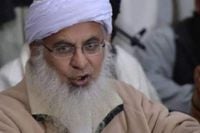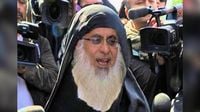Islamabad has become the center of a controversial discourse as Maulana Abdul Aziz Ghazi, a cleric from the infamous Lal Masjid, publicly condemned the Pakistani government for its actions against its own citizens. In a speech that has since gone viral on social media, Ghazi questioned the very premise of a potential war with India, asserting that such a conflict would be against Islamic principles.
During a prayer gathering at the mosque, Ghazi posed a provocative question to the audience: "If Pakistan goes to war with India, how many of you would raise your hands to fight?" The response was telling; no hands were raised, which Ghazi interpreted as a sign of widespread disillusionment among the populace. "If no one is willing to raise their hands, it indicates a clear lack of faith in the government and military," he remarked.
Ghazi’s remarks come amidst rising tensions between India and Pakistan, but he emphasized that the real threat lies within Pakistan itself. He accused the government of bombing its own people, particularly in regions like Balochistan and Khyber Pakhtunkhwa. "Our government is killing its own citizens," he stated, highlighting the injustices faced by the Baloch and Pashtun populations. He described disturbing incidents where the military allegedly abducts individuals, inflicts harm upon them, and conducts bombings in their villages.
According to Ghazi, the Pakistani military and government are more interested in maintaining power than addressing the needs of their citizens. "These people are only interested in their own power. They do not protect the country or the religion; instead, they see their own people as enemies," he criticized. His comments reflect a growing sentiment of dissatisfaction among the Pakistani populace, who are increasingly vocal about their grievances against the state.
In a striking contrast, Ghazi pointed out that India does not bomb its own citizens in the same manner. He questioned, "Does India bomb its own citizens? Has there been a report of people disappearing in India like we have here?" This comparison aimed to underscore the severity of the situation in Pakistan, where citizens are often subjected to state violence.
Ghazi also referenced the infamous 2007 siege of the Lal Masjid, which resulted in a military operation led by former President Pervez Musharraf. This event has become a significant point of contention, as the mosque has long been associated with anti-state sentiments and calls for the imposition of Sharia law in Pakistan. The military operation, dubbed "Operation Sunrise," was a response to the mosque's leadership, which openly challenged the government.
As tensions continue to escalate, Ghazi’s remarks resonate with a populace that is increasingly frustrated with their leaders. The cleric's speech highlights a critical moment in Pakistani society, where the intersection of religion, politics, and military power is under scrutiny. His call for introspection among the people suggests that the government may face significant challenges if it does not address the concerns of its citizens.
Moreover, Ghazi’s assertions have sparked discussions about the role of the military in Pakistan's internal affairs. The cleric criticized the military leadership, particularly General Asim Munir, for failing to protect the interests of the nation. He warned that the patience of the people is wearing thin, suggesting that the internal unrest could soon escalate into a more volatile situation.
In a further escalation of rhetoric, Pakistan’s Defense Minister Khawaja Asif recently threatened India with nuclear action, stating that Pakistan is prepared to respond decisively to any military aggression. However, the general populace appears to be increasingly skeptical of such threats, as indicated by Ghazi’s speech and the lack of support from the audience.
This growing discontent among the citizens of Pakistan represents a significant shift in the narrative surrounding national security and governance. As the country grapples with internal strife and external pressures, the voices of dissent are becoming louder, calling into question the legitimacy of the current government and its military.
In conclusion, Maulana Abdul Aziz Ghazi’s recent statements reflect a critical moment in Pakistani society, where the intersection of military power, governance, and public sentiment is being challenged. As the country faces increasing internal and external pressures, the need for a reassessment of priorities and actions is becoming more urgent. The call for unity against external threats is being overshadowed by the pressing need to address the injustices faced by the people within Pakistan.





